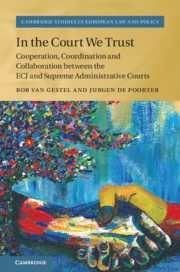 In the Court We Trust
In the Court We Trust Published online by Cambridge University Press: 28 November 2019
In this chapter the research question is answered but, more importantly, three scenarios as sketched concerning the way to move forward: cooperation, coordination, and collaboration. The cooperative scenario is an informal inter-organisational relationship lacking a common mission, structure or joint planning but focuses mostly on improving the current information exchange, for example, by the publication of more (translated) documents and enhancing current digital platforms. In the coordination scenario the CJEU and Supreme Administrative Courts are going to work together more actively to advance their separate, yet compatible missions to advance the working of the preliminary reference procedure via more formalized communication channels and a more active role for national courts, for example, as amicus curiae. In the third scenario, national Supreme Courts become European courts and not only from the receiving end. They will be given a more prominent role in filtering, synthesizing and distributing preliminary questions from lower courts and become decentralized EU courts dealing with most bulk cases that currently fill the docket of the CJEU. This would enable the Luxembourg court to develop into a real constitutional court of the EU with less attention for dispute resolution and more attention for judicial law making.
To save this book to your Kindle, first ensure no-reply@cambridge.org is added to your Approved Personal Document E-mail List under your Personal Document Settings on the Manage Your Content and Devices page of your Amazon account. Then enter the ‘name’ part of your Kindle email address below. Find out more about saving to your Kindle.
Note you can select to save to either the @free.kindle.com or @kindle.com variations. ‘@free.kindle.com’ emails are free but can only be saved to your device when it is connected to wi-fi. ‘@kindle.com’ emails can be delivered even when you are not connected to wi-fi, but note that service fees apply.
Find out more about the Kindle Personal Document Service.
To save content items to your account, please confirm that you agree to abide by our usage policies. If this is the first time you use this feature, you will be asked to authorise Cambridge Core to connect with your account. Find out more about saving content to Dropbox.
To save content items to your account, please confirm that you agree to abide by our usage policies. If this is the first time you use this feature, you will be asked to authorise Cambridge Core to connect with your account. Find out more about saving content to Google Drive.